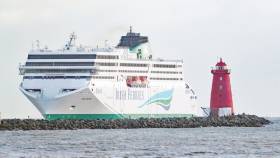Displaying items by tag: Delayed ferry
New Clyde Ferry Is Hugely Delayed will Need Eight Weeks of Trials after Shipyard Completion – CalMac
Glen Sannox, the massively delayed Scottish ferry for operator CalMac, will need nearly two months of further tests before the 1,000 passenger capacity vessel can enter service on the Firth of Clyde.
In addition the duel-fuelled powered ferry which is to serve the Isle of Arran route, will also have to undergo "extensive” sea trials prior to completion by shipyard Ferguson Marine which John Swinney related to MSPs last week.
CalMac, has confirmed to The Scotsman, of the duration of the additional “familiarisation and network trials” that will be required before the hybrid newbuild will be able to operate on the Ardrossan-Brodick route.
Such trials of the 102m newbuild is likely to increase the pressure to have the new ferry ready for next year’s summer season after Deputy First Minister announced a further delivery delay at the shipyard owned by the Scottish government.
The delay at the Clydeside shipyard, is now to see the 16.5 knot ferry enter from May to this autumn, if not the end of the year.
A twin of Glen Sannox, the as-yet unnamed hull (#802) to operate between Uig, Harris and North Uist, will also be delayed, from March 2024 to “late summer”, if not the end of the year.
According to spending watchdog, Audit Scotland they expect the project to cost at least £293 million – this amount is three times the cost of the original contract and as Afloat reported the Glen Sannox was due to enter service in 2018.
More here on the shipbuilding story.
Profits Sink at ICG after Ferry Schedule Disruptions
#ferries - The Irish Continental Group has reported lower revenues and profits for 2018 on the back of disruption to its ferry schedules and higher fuel costs, writes RTE News.
Revenues at ICG, which owns Irish Ferries, slipped by 1.5% to €330.2m from €335.1m in 2017 while EBITDA fell by 15.6% to €68.4m from €89m
The company's adjusted earnings per share sank over 31% to 30.4 cent in 2018 from 44.1 cent the previous year, while its operating profits slumped by 32.6% to €60m from €89m.
Its fuel costs during the year increased by 19.6% to €48.2m.
During the year Irish Ferries encountered "technical difficulties" with its Ulysses ferry, while it also saw the late delivery of its new WB Yeats ferry. This ferry had been scheduled to start sailing last summer but only entered service in January of this year.
Operating initially on the Dublin-Holyhead route, it is due to switch to the Dublin-Cherbourg route in March.
For more including comment from ICG's chairman, click here.





























































